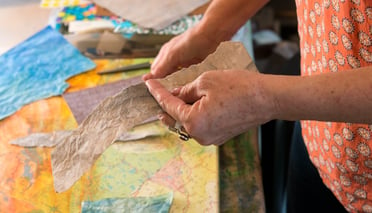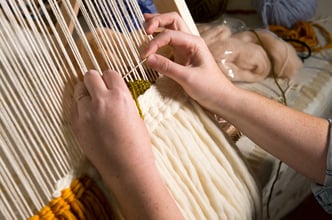 Every group and culture has its own way of expressing and sharing ideas that develops over time. Now, during the rise of the Maker Movement, participants and supporters of this new maker culture are developing their own rhetoric, one that focuses on the creative spirit and the collective shift away from commercialism that inspires people to work with their hands to make something completely new.
Every group and culture has its own way of expressing and sharing ideas that develops over time. Now, during the rise of the Maker Movement, participants and supporters of this new maker culture are developing their own rhetoric, one that focuses on the creative spirit and the collective shift away from commercialism that inspires people to work with their hands to make something completely new.
In order to understand and join conversations with today's makers (and we've learned that makers do welcome brands into their social spheres), you need to understand that some words mean a little bit more to makers than their common definitions. Here are some of the terms you need to know in order to connect with today's makers.
Maker Vocabulary: The Terms You Should Know
 Community: To a maker, the community is not made up of just the local surrounding and people. To makers, the community they reside in is global, interconnected by the internet and by relationships with others. To them, a community is not a place, but a culture and a support system of others who want to see them succeed and lend a hand when they can.
Community: To a maker, the community is not made up of just the local surrounding and people. To makers, the community they reside in is global, interconnected by the internet and by relationships with others. To them, a community is not a place, but a culture and a support system of others who want to see them succeed and lend a hand when they can.- Market: A market isn't a place to buy groceries to makers. It's a place to come together with other makers (sometimes monthly, annually, or otherwise regularly) to share what they've made with others and create new connections with their work and the people who appreciate the effort that goes into it.
- Influencer: To makers, influencers aren't just the most popular people on any given online platform, or the people with the most followers or the fanciest equipment. An influencer is someone a maker can trust because of their values, their reputation, their personality, and their honesty. An effective influencer, furthermore, is someone who a maker can see bits and pieces of themselves in because it's clear that this person has actually put in the work to hone their craft.
 DIY: DIY (or "do it yourself") is not as solitary of a pursuit as it sounds. For makers, the DIY is the part of a project where they use their own hands or their own tools to create something that didn't exist before. However, in order to DIY, makers need helpful information and advice from others on all topics related to their craft. While the work is proudly their own, they're not really alone in their DIY projects. (By the way, DIY also refers to home remodeling and car repair projects, not just Pinterest-worthy crafts.)
DIY: DIY (or "do it yourself") is not as solitary of a pursuit as it sounds. For makers, the DIY is the part of a project where they use their own hands or their own tools to create something that didn't exist before. However, in order to DIY, makers need helpful information and advice from others on all topics related to their craft. While the work is proudly their own, they're not really alone in their DIY projects. (By the way, DIY also refers to home remodeling and car repair projects, not just Pinterest-worthy crafts.)- Content: You might think of content as just the pretty, polished stuff you post for your followers to see online, and those posts are incredibly important. But to makers, all the information you can give them is content in their eyes. The technical information, product descriptions, and pro advice listed on your website is a goldmine of information for makers alongside your promotional and instructional content, too.
- Experiment: In some sense, an experiment is a highly controlled test to either prove or reject a hypothesis. To makers, experimentation is a way of life that's much less scientific. While makers do a lot of research before they try or test out a new product, the trial and error of working it into their toolkit is much more emotional and messy. They're almost always willing to try something new, and if they like the result and what the product felt like to use, they'll stick with it.
 Process: You might think of a process as a formal list of steps, clearly mapping a project from beginning to end. While most makers do follow some type of creative structure, the word "process" encompasses much more. Their process starts long before they actually start working with their hands, with research, inspiration, and designing. The process extends through the end of the project, when they reflect, gather feedback, and share their work with others. And when something goes wrong, makers have to be adaptable to a new process (which is why some of them don't have a process at all — they just go with what feels right).
Process: You might think of a process as a formal list of steps, clearly mapping a project from beginning to end. While most makers do follow some type of creative structure, the word "process" encompasses much more. Their process starts long before they actually start working with their hands, with research, inspiration, and designing. The process extends through the end of the project, when they reflect, gather feedback, and share their work with others. And when something goes wrong, makers have to be adaptable to a new process (which is why some of them don't have a process at all — they just go with what feels right).- Growth: To most of us, growth means development, moving forward with some kind of quantifiable increase. For makers, growth is much more than just a number of followers, completed projects, or sales. Growth is something that happens inside as they gain more skills and knowledge to help them keep pushing the potential of what their craft can be. Growth isn't a destination, it's a journey for today's makers.
However, Makers Don't Have a Word For Everything
Now that you have some new definitions in mind, it's also important to remember that the maker community, and the Maker Movement itself, is still expanding, flourishing, and figuring out how it fits into the rest of our current culture. Or even bigger yet, if it is becoming our entire culture. So while the push for more creativity and less mass-consumption continue to develop, so will the language we use to describe and define that lifestyle.

One point of debate within the movement is how makers, or subgroups of makers, choose to self-identify. For instance, we've found that those who sew can't seem to settle on a blanket term for their craft and instead choose individual identifiers (or none at all). As for all makers and DIYers in general, they also have a choice before them: whether to take on the all-encompassing title of "maker" or to forego a label that defines their entire life. Some people prefer not to use an identifier because they play many more roles in their life than just a "maker" — their craft or hobby is only part of their life.
And speaking of hobbies, it's important to mention that for every professional or side-hustling maker, there are many more people who craft or restore or design purely as a hobby for their own enjoyment. These hobbyists are just as important, if not even more powerful as an audience, as makers who would love to make money at their craft. Especially when you consider that hobbyists perhaps have the most to learn (and often more easily accommodated buying habits), there's a huge opportunity there to add value to their creativity with your brand.




